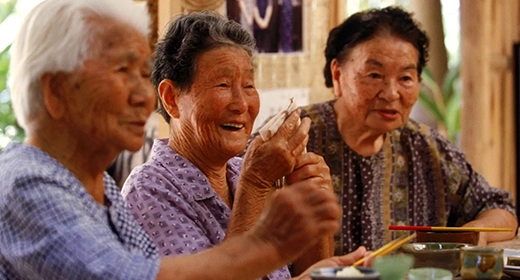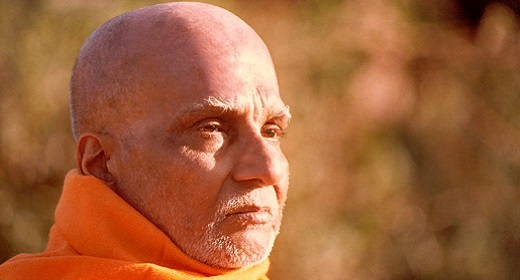by Mark Stibich, PhD: You might already be familiar with Blue Zones: five specific places in the world where people are living considerably longer, healthier and happier lives.
 In 2004 National Geographic Fellow and New York Times bestselling author Dan Buettner teamed up with National Geographic and some of the world’s top longevity researchers to identify the parts of the world where people are living significantly longer lives.
In 2004 National Geographic Fellow and New York Times bestselling author Dan Buettner teamed up with National Geographic and some of the world’s top longevity researchers to identify the parts of the world where people are living significantly longer lives.
Through their research, Buettner and his colleagues found that people living in Blue Zones all shared similar lifestyle characteristics. One of these Blue Zones is Okinawa, Japan, the largest of the Okinawa Islands and the Ryukyu Islands of Japan.
What Are Okinawans Doing Right?
This is a question that has been studied since 1976. Over the years, the lifestyles and genetics of more than 800 Okinawan centenarians have been well-documented.4 Here are some of the fascinating findings:
- Data is accurate. Great attention has been paid to validating the claims of Okinawan centenarians. Luckily Japan instituted a strict record-keeping system and census policy in the 1870s, so the lifestyle claims of long-lived Okinawans are able to be verified.
- They age well. Not only do Okinawans live longer, but they age incredibly well. Many of the centenarians studied were lean, energetic and had low rates of chronic illnesses like heart disease and cancer.
- It’s genetic. Studies show that the genetic makeup of Okinawans helps in preventing inflammatory and autoimmune diseases. Siblings of long-lived Okinawans also tend to live long, healthy lives. However, when Okinawans moved to new environments and their lifestyle habits change, they lost their longevity. This indicates that other factors are at play besides genetics.
- They have less free radicals. The centenarians studied had lower levels of free radicals in their blood.5 This is largely due to the fact that Okinawans simply eat fewer calories than the average person due to a cultural practice of eating until you are only 80 percent full, known as Hara Hachi Bu. Fewer calories mean fewer free radicals are created in the digestive process. Fewer free radicals mean better cardiovascular health and less risk of cancer and other chronic illnesses.
- Their hearts are in great condition.4 Those studied had clean, healthy arteries, low cholesterol, and low homocysteine levels. Researchers believe these low, healthy levels may decrease the risk of heart disease in Okinawans by as much as 80 percent. The reasons for these low levels are thought to be linked to a healthy diet, high levels of physical activity, moderate alcohol consumption, nonsmoking and a positive attitude.
- They’re at a lower risk of developing cancer. Okinawans also have less risk of hormone-dependent cancers, like breast, prostate, ovarian and colon cancers.4 Specifically, they have less risk of breast and prostate cancer, and less risk of ovarian and colon cancers. Researchers attribute this risk reduction to eating fewer calories, consuming lots of fruits and vegetables, eating healthy fats, eating plenty of fiber and staying physically active.
- Their bones are healthy. Okinawans also have less risk of hip fractures than Americans. The bone density for the centenarians decreases at a slower rate than other Japanese people. This may be due to higher calcium intake in the Okinawan diet, more exposure to vitamin D through sunlight and higher levels of physical activity.
- Women go through natural menopause. Women in Okinawa do not use estrogen replacement therapy but still have few menopause-related complications. It is thought that the phytoestrogens in soy, a common food on Okinawa, as well as high levels of physical activity, help reduce the negative effects of menopause.
- They have more sex hormones. Okinawans have more natural DHEA, estrogen, and testosterone than Americans of the same age.7 Each of these hormones is thought to indicate hormonal age. High levels of testosterone help maintain muscle mass. Estrogen is thought to protect against osteoporosis and heart disease. DHEA is known to decrease with age, and some researchers use DHEA levels as a marker of how rapidly someone is aging. Diet and continual physical activity are thought to explain why these hormones remain so high in elderly Okinawans.
- They’re happy. When the personalities of Okinawans were tested, it was found that they were generally stress-free and maintained a positive outlook on life.8 They had strong coping skills and a deep sense of spirituality, meaning, and purpose. Positive outlook Okinawans is also thought to explain their reduced risk for dementia.
The Bottom Line
The Okinawans show us that living a healthy lifestyle will not only help us live longer but will also help us live disease-free. Lifestyle changes can add healthy years to your life, making you feel better now and when you are 110. Get started now by learning to change your eating habits, exercise more and relax.
Verywell Health uses only high-quality sources, including peer-reviewed studies, to support the facts within our articles. Read our editorial process to learn more about how we fact-check and keep our content accurate, reliable, and trustworthy.







































